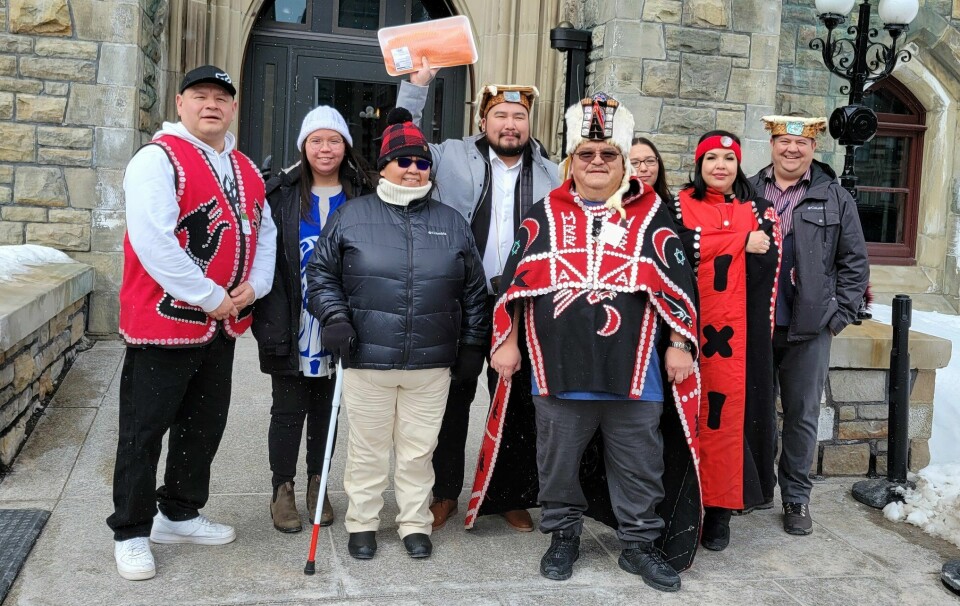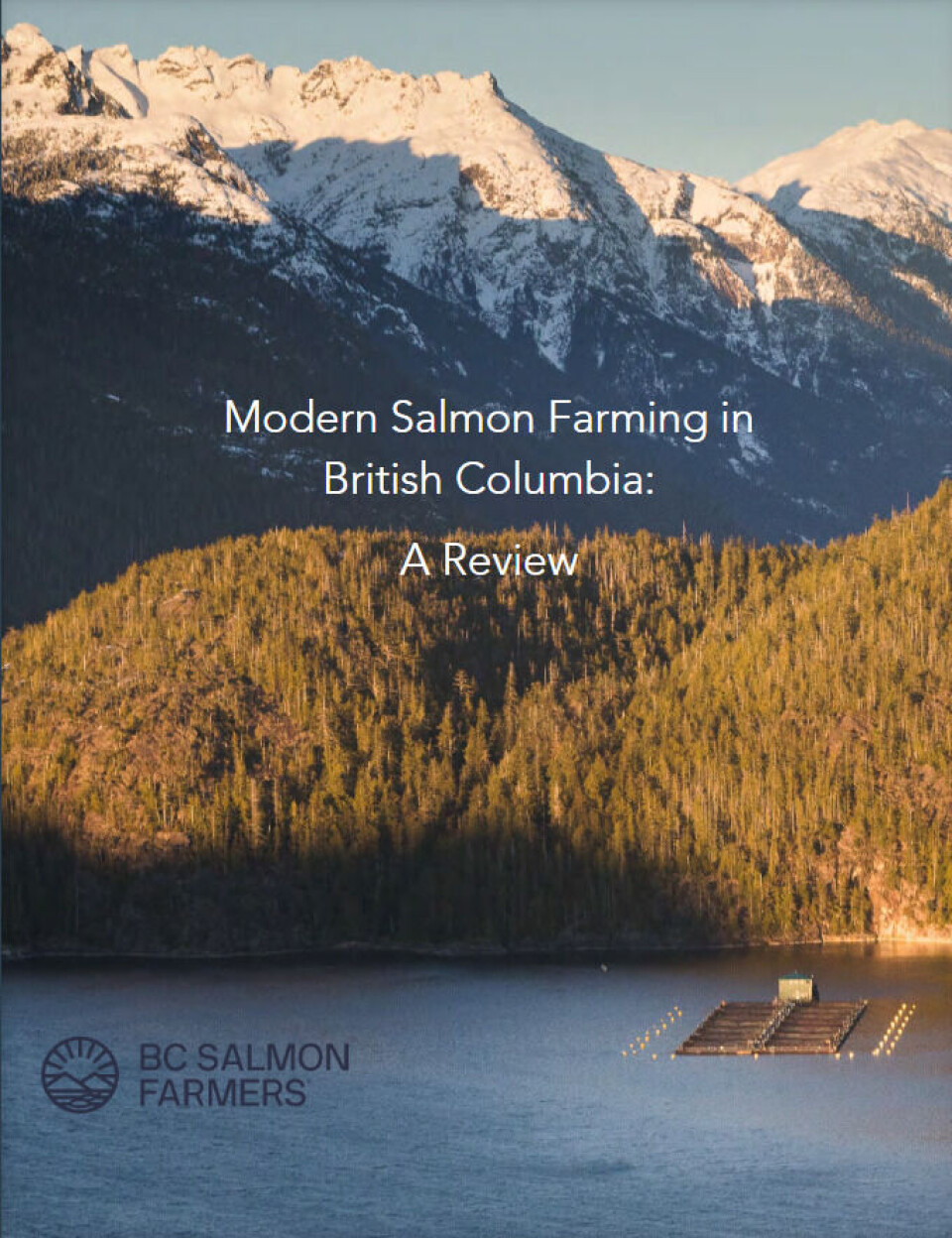
Doing it by the book
First Nations and BC salmon farmers publish 500-page review to inform Indigenous communities about modern reality of sector
A 500-page ‘textbook’ about the British Columbia salmon farming sector has been published ahead of the Canadian federal government’s decision on licence renewals for farms in the province.
The textbook is the result of a collaboration by BC’s Coalition of First Nations for Finfish Stewardship (the Coalition), the BC Salmon Farmers’ Association (BCSFA), and the BC Centre for Aquatic Health Sciences (BC CAHS) and uses contributions and data from First Nations, Pacific Ocean scientists, the salmon sector, subject matter experts, government and eNGOS.
The publication, called Modern Salmon Farming in British Columbia: A Review, was commissioned by the Coalition and other Rightsholder First Nations that host salmon farming in their traditional territories to provide additional transparency and details of salmon farming operations to answer questions from Indigenous communities as the federal government’s transition for the sector nears.

Knowledge gaps
“As First Nations with salmon farming in their territories move forward on the sector’s transition with government, some of our communities have noticed knowledge or information gaps regarding modern salmon farming. Our leadership wants to make the best-informed decisions for our communities regarding the sector and our marine management plans. This is why we asked the BCSFA to put together a ‘textbook’ of information on fish farms that would answer the questions coming from our members,” said Dallas Smith, spokesperson for the Coalition and member of the Tlowitsis Nation.
“As our partners, the BCSFA went above and beyond to compile this information – which is obvious by the size of the 500-page document. This collection of Western science and data is a good base for us to apply our rich traditional knowledge to so that our leadership is armed with the holistic information we need to steward our waters and wild salmon, while protecting the social and economic health of our communities.”
The BCSFA has been compiling the science review for the past year and published it online on Friday. At the same time, the Coalition has sent copies to dozens of First Nations across the province in the spirit of creating a Nation-to-Nation dialogue.
13 chapters
Topics covered in the publication across 13 chapters include the current state of Pacific salmon, sea lice, fish health, benthic conditions, incidental catch, mammal interactions, and First Nations stewardship.
“While the development of this review has been a rigorous effort, it is important to show that we truly are committed to trust and transparency with, first and foremost, the First Nations in whose territories we operate, as well as the public and government decision-makers,” said Brian Kingzett, executive director of the BCSFA.
“BC salmon farmers have always been committed to respecting First Nations, responsible practices, environmental stewardship, and community engagement. We are furthering our commitment to transparency of our operations as we continue to innovate to reduce our environmental impact.
“This scientific review document reinforces the sector’s position as a responsible contributor to the economy, the environment, and the well-being of coastal communities.”
First Nations inclusion
Modern Salmon Farming in British Columbia: A Review also expands on the importance of First Nations inclusion in the operations and data analysis of the sector, particularly in applying their traditional knowledge and oversight utilising stewardship programs like Guardian Watchmen.
The BC Centre for Aquatic Health Sciences (BC CAHS) is an ISO-accredited lab in Campbell River whose governance is now Indigenous-led. BC CAHS is an independent non-profit that specialises in working with wild and farmed salmon and focuses on inclusive science with local First Nations. It will add its services to the new Indigenous Centre for Aquatic Health Sciences and Stewardship (iCAHS) planned on Wei Wai Kum territory.

“CAHS is an Indigenous-governed and science-led independent organisation committed to scientific excellence, cultural respect, and environmental stewardship. We aim to bridge traditional knowledge with modern science through collaboration and innovation, ensuring a sustainable future for all,” said the Centre’s managing director Dr Ahmed Siah.
“We strongly feel this collaborative effort, Modern Salmon Farming in British Columbia: A Review, aligns with many of our values, goals, practices, and priorities at CAHS and serves as an inspiring example of what happens when First Nations are given a leadership seat at the table of Western science, especially when it concerns their traditional territories. This is how CAHS is committed to our operations, now and into the future.”
Licence renewals
In June 2022 federal fisheries minister Joyce Murray, who
opposed open net pen farming, renewed licences for 79 salmon farms in BC but
only for two years. Murray was later sacked and replaced by Diane Lebouthillier.
First Nations who allow salmon farming in their territories want Lebouthillier to
issue new licences to least a minimum of eight years.
The minister is expected to announce the salmon farming licensing decision in BC later this spring as she meets her mandate to finalise a “responsible, realistic and achievable” Transition Plan for the sector by 2025.
“BC coastal First Nations have been the stewards of our waters since time immemorial. Today, our stewardship includes both conservation and exploration of marine-based economic opportunities for our communities, like salmon farming,” said Smith.
“At a time when Canadians are worried about food security, food affordability, and climate change, our communities have both the traditional knowledge and now a textbook of scientific evidence to choose how to best include salmon farming in our ocean and economic planning.
“This way, coastal First Nations can participate in Canada’s Blue Economy and help put food on tables for families across the country.”























































